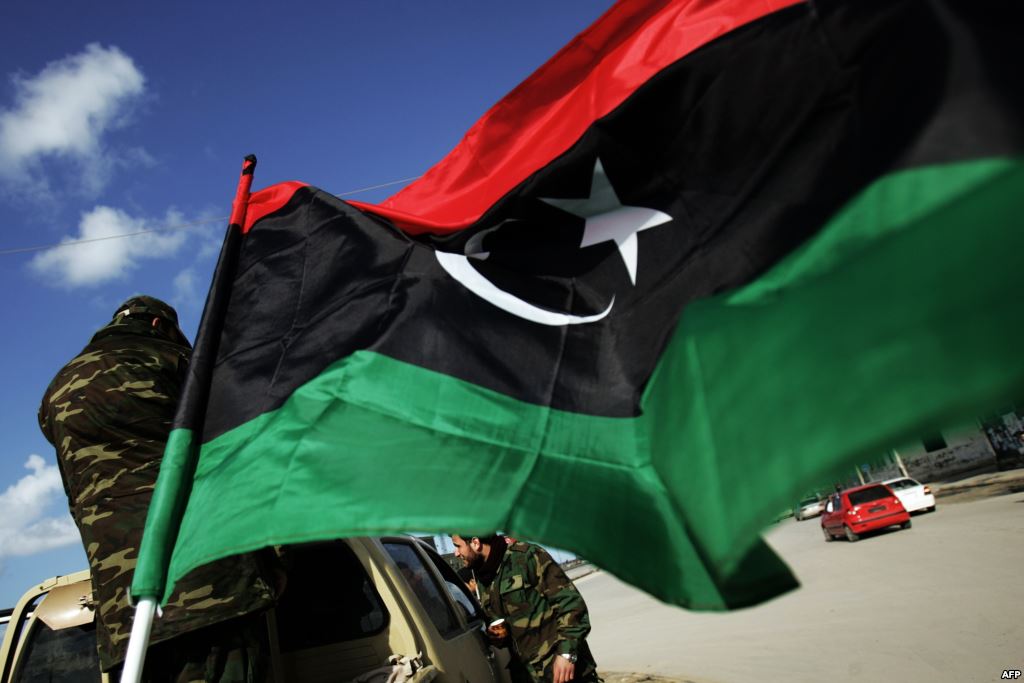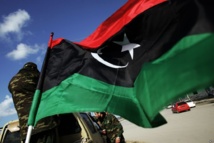"The February 17 Revolution is a challenge that Libyans must live up to," he said in a televised speech to the nation late Sunday, acknowledging the "difficulties" ahead.
The United States, Britain and the United Nations all issued statements stressing the importance of Libya meeting the challenges it faces.
Although no official ceremonies were organised, spontaneous celebrations have taken place since Saturday across Libya and culminated in festivities Monday in the capital Tripoli.
The streets have been decked with Libya's revolutionary flag, volunteers have cleaned up streets and painted over sidewalks, and multicoloured lights have been strung across the main roads.
But for many Libyans there is little to celebrate.
"There is noting to be proud about," one Tripoli resident wrote on Twitter.
University student Ahmed Fitouri agreed. "Nothing has been accomplished these past three years. We are stuck."
Three years after the uprising, Libya is still struggling to rebuild an army capable of curbing unrest blamed largely on well-armed Islamists and former rebels.
The government and the interim parliament, the General National Congress, have come under increasing criticism from Libyans who accuse them of corruption and failing to provide them with a better life.
Common criminals roam the streets, and rival tribes in various parts of the country shoot it out to settle long-standing disputes.
Politicians, security officials, journalists, judges and even a US ambassador have been killed in a wave of lawlessness that has grown since Kadhafi was captured and killed in October 2011.
Disgruntled citizens have managed to blockade and shut down Libya's oil terminals, threatening to bankrupt a government that relies almost exclusively on oil revenues to operate.
- Economy taken beating -
On the political front, the GNC, the country's top authority, infuriated Libyans when it decided to extend its mandate by 10 months beyond a February 7 deadline.
But deputies on Sunday said the parliament has reached consensus on holding early elections, apparently yielding to popular pressure and threats that divisions could unleash further unrest.
The economy of oil-rich Libya has also taken a beating because of chronic security problems and industrial action since the end of Kadhafi's four-decade autocratic rule.
The oil ministry and the World Bank estimate Libya has lost more than $10 billion in revenues because of the crisis that erupted last July when striking workers and pro-autonomy demonstrators in the east began blockading the country's main terminals.
Post-war reconstruction has been slow and major infrastructure projects put on the back-burner, while multinationals have yet to make a return.
The World Bank, in a report issued last month, stressed "the urgent need for economic diversification in order to ensure long-term financial and economic stability."
"We must set aside our differences on the occasion of this historic event, in memory of the martyrs who fell so that we can enjoy freedom," said Tripoli University professor Ali Toukabri.
Analyst Soufiene al-Machri blamed the impasse on politicians who are clinging to power.
---------------------------------------------------
The United States, Britain and the United Nations all issued statements stressing the importance of Libya meeting the challenges it faces.
Although no official ceremonies were organised, spontaneous celebrations have taken place since Saturday across Libya and culminated in festivities Monday in the capital Tripoli.
The streets have been decked with Libya's revolutionary flag, volunteers have cleaned up streets and painted over sidewalks, and multicoloured lights have been strung across the main roads.
But for many Libyans there is little to celebrate.
"There is noting to be proud about," one Tripoli resident wrote on Twitter.
University student Ahmed Fitouri agreed. "Nothing has been accomplished these past three years. We are stuck."
Three years after the uprising, Libya is still struggling to rebuild an army capable of curbing unrest blamed largely on well-armed Islamists and former rebels.
The government and the interim parliament, the General National Congress, have come under increasing criticism from Libyans who accuse them of corruption and failing to provide them with a better life.
Common criminals roam the streets, and rival tribes in various parts of the country shoot it out to settle long-standing disputes.
Politicians, security officials, journalists, judges and even a US ambassador have been killed in a wave of lawlessness that has grown since Kadhafi was captured and killed in October 2011.
Disgruntled citizens have managed to blockade and shut down Libya's oil terminals, threatening to bankrupt a government that relies almost exclusively on oil revenues to operate.
- Economy taken beating -
On the political front, the GNC, the country's top authority, infuriated Libyans when it decided to extend its mandate by 10 months beyond a February 7 deadline.
But deputies on Sunday said the parliament has reached consensus on holding early elections, apparently yielding to popular pressure and threats that divisions could unleash further unrest.
The economy of oil-rich Libya has also taken a beating because of chronic security problems and industrial action since the end of Kadhafi's four-decade autocratic rule.
The oil ministry and the World Bank estimate Libya has lost more than $10 billion in revenues because of the crisis that erupted last July when striking workers and pro-autonomy demonstrators in the east began blockading the country's main terminals.
Post-war reconstruction has been slow and major infrastructure projects put on the back-burner, while multinationals have yet to make a return.
The World Bank, in a report issued last month, stressed "the urgent need for economic diversification in order to ensure long-term financial and economic stability."
"We must set aside our differences on the occasion of this historic event, in memory of the martyrs who fell so that we can enjoy freedom," said Tripoli University professor Ali Toukabri.
Analyst Soufiene al-Machri blamed the impasse on politicians who are clinging to power.
---------------------------------------------------









 Home
Home Politics
Politics











